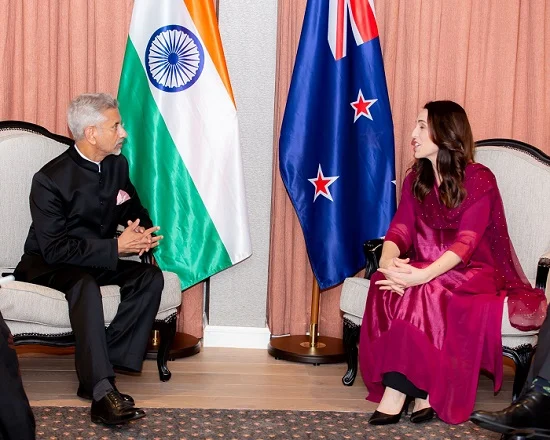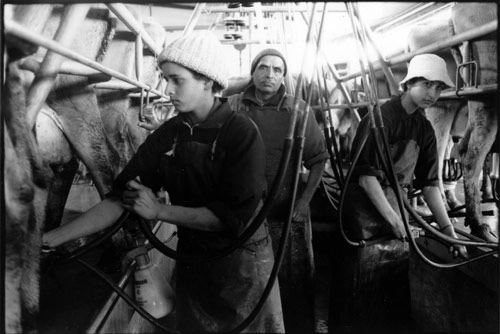

External Affairs Minister S Jaishankar with New Zealand Prime Minister Jacinda Ardern in Auckland on Thursday (Image courtesy: Twitter/@DrSJaishankar)
As it changes its immigration settings to attract high-skilled migrants, New Zealand is eyeing those Indians through the green list who fit well in the roles of dairy farm managers or are experts in the field of Information and Communication Technology (ICT).
Opportunities for expanding the relationship and cooperating on new areas such as climate change and sustainable agriculture were discussed in detail during S Jaishankar’s visit to the Pacific country – the first by an Indian External Affairs Minister (EAM) since 2001.
New Zealand believes that reopening its borders after the long Covid closure has provided a timely opportunity to re-engage with India and attract talented migrants with a clear pathway to residency for globally hard-to-fill roles.
“The Indian community accounts for about five per cent of our population, or almost 240,000 people. In our largest city, Auckland, that figure stands at 10 per cent. It’s no surprise that Hindi is our fifth most spoken language,” said New Zealand Foreign Minister Nanaia Mahuta as she welcomed Jaishankar with a mihi whakatau ceremony at Auckland War Memorial Museum on Thursday.


The island nation values migrant dairy farm workers and there are almost as many dairy cows in New Zealand as there are people. It is a big business and also the country’s top export earner with many Indians playing an active role in the industry.
On a visit to New Delhi last month, New Zealand’s Minister of Trade and Export and Agriculture Damien O’Connor held talks with Parshottam Rupala, India’s Fisheries, Animal Husbandry, and Dairying Minister, as the two sides exchanged information and expertise to build knowledge and capability of each other’s animal husbandry sector.
In Auckland on Thursday, Jaishankar acknowledged that there are perhaps demands in New Zealand that could be met out of India.
India is also New Zealand’s second-largest source of international students, with over 17,000 Indian students studying in New Zealand.
“We spoke a bit about the need for better air connectivity. I also raised with the Minister, concerns which some of our students have faced, students who had to leave New Zealand during the Covid period and who didn’t have the opportunity to get their visas renewed,” said Jaishankar.
The minister stated that there was also “a very open discussion” on how India and New Zealand together will shape the larger Indo-Pacific region.
“There was a discussion on some current, some pressing issues like the security situation in the Indo-Pacific, the consequences of the Ukraine conflict and naturally we spent some time on the major global issues, most of all climate action, climate justice,” the EAM mentioned.
While India has shown interest in joining the Global Research Alliance on Agricultural Greenhouse Gases, which promotes international cooperation and research to find ways to grow more food without growing greenhouse gas emissions, New Zealand continues to make progress towards joining the International Solar Alliance established by India and France in 2015.
“It promotes solar energy through research, development and innovation and mobilises investment for affordable solar energy around the world, including the Pacific,” said Mahuta.
Also Read: India sends indelible ink to Fiji to help anchor democracy in Pacific
Prime Minister Narendra Modi held a telephonic conversation with US President Donald Trump on the…
The launch of Axiom Mission 4, the fourth private astronaut mission to the International Space…
The Embassy of Iran in India on Wednesday shared a statement made by the Director-General…
India and Canada agreed to resume full diplomatic services, ending the thaw between the two…
Prime Minister Narendra Modi held a bilateral meeting with his Canadian counterpart Mark Carney on…
Prime Minister Narendra Modi engaged in a flurry of high-level bilateral meetings with leaders from…